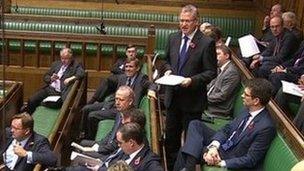Tories defend EU referendum plan amid Labour blocking efforts
- Published

Conservative MPs were told to limit their contributions to allow amendments to be discussed
Conservative MPs have rallied behind a bill promising an EU referendum in the face of Labour attempts to derail it.
Legislation urging a referendum by 2017 was discussed for five hours but no major votes were held and the debate was adjourned until later this month.
Deputy PM Nick Clegg later criticised the Tories for "flirting" with an EU exit, while Labour MPs sought to delay the bill's passage through the Commons.
But its sponsor, Tory MP James Wharton, said it had made "reasonable progress".
The first in three days of detailed debate on Mr Wharton's bill concluded with Conservatives and Labour arguing over parliamentary tactics.
In an effort to slow its progress, Labour MPs raised a host of related issues at length, including whether residents of Gibraltar and prisoners should be able to vote in a future referendum.
'Denying choice'
Mr Cameron's referendum pledge, following a renegotiation of the UK's relationship with Brussels, cannot be made law in the form of a coalition government bill because of Lib Dem opposition.
"I think the Conservative Party is wrong to be flirting with exit from the European Union," Mr Clegg told the BBC.
"Hundreds of thousands, millions of jobs depend on our place in what is the world's largest borderless single market."
Tory backbencher Mr Wharton agreed to propose the legislation after he came top in a ballot of MPs private members' bill and many Tories pushed for the referendum commitment to be made binding before the 2015 general election.
The bill has now reached its "report stage", where amendments can be discussed in detail. More than 50 amendments have been tabled, including 36 alone by Labour's Mike Gapes.
Mr Gapes, who spoke for about an hour, defended his approach, saying the bill as it stood was "inadequate" and required "more proper consideration".
His colleague Barry Sheerman said it was "furtive and unseemly" to have such an important constitutional matter considered via a private member's bill rather than through government legislation.
And Labour leader Ed Miliband, who was not present for the debate, said the bill was an exercise in the "Conservative Party talking to itself".
'2017 dream'
Mr Wharton told the BBC's Daily Politics his bill was making "reasonable progress" but acknowledged it was "going to be slow going".
He said Labour and Lib Dem opponents wanted to delay the bill so it ran out of parliamentary time, adding: "We are going to do everything we can to stop that from happening".
However, Conservative MP Adam Afriyie, has tabled an amendment calling for the referendum to happen in October next year instead - arguing that delaying a vote for four years will play into the hands of the UK Independence Party.
Speaking in the Commons, Mr Afriyie likened the promise of a referendum to a "can that has been kicked down the road for generation after generation" and urged MPs to "settle the question now".
"I ask a simple question," he said. "If not in this Parliament, when else can we be sure of securing a referendum...By chasing the EU referendum dream in 2017, we risk losing one in 2014 and throwing away the 2015 election."
Asked about Mr Afriyie's amendment, Mr Wharton said: "One Conservative MP has said 'I think perhaps we should look at a different date' and what we have found in recent months is that there is not a lot of support for that."
'Pithy'
Private members' bills normally have little chance of becoming law due to lack of parliamentary time, unless they are backed by the government.
But Mr Wharton's bill is being treated differently because David Cameron wants it to become law, to send a signal to his MPs and the public that he is serious about his commitment to hold a referendum.
Lib Dem MP Martin Horwood and Conservative MP James Wharton on the EU Referendum bill
Tory MPs are under a "three line whip" to support the bill but few are speaking in Friday's debate amid concerns that this would limit the time for discussion and play into the hands of the bill's opponents.
Foreign Secretary William Hague has written to all Conservatives to urge them to make their remarks "short and pithy".
If it looks like the legislation will be "talked out" by opponents giving long speeches, Mr Wharton can ask for a "closure motion". If backed by a majority of MPs, numbering at least 100, this would allow the bill to be voted on as a whole.
'Frivolous'
Lib Dem MP Martin Horwood said Parliament was "only doing its job" by scrutinising the legislation, pointing out that the status of Gibraltar was highly significant and its omission from the bill was first raised by a Conservative.
However, he acknowledged that opponents of the bill would not do themselves any favours by tabling "frivolous" amendments and Parliament must focus on the substance of the benefits of UK membership.
UKIP, which has no representation in the Commons, urged MPs to back Mr Afriyie's call for the referendum to be brought forward.
"I hope MPs do what's right, by voting to give the British people a say on the EU as soon as possible," the party's leader Nigel Farage said.
If it makes it through the Commons, it will go to the Lords for further discussion in the next few months.
- Published10 October 2013
- Published8 November 2013
- Published1 July 2013
- Published5 July 2013
- Published23 July 2013